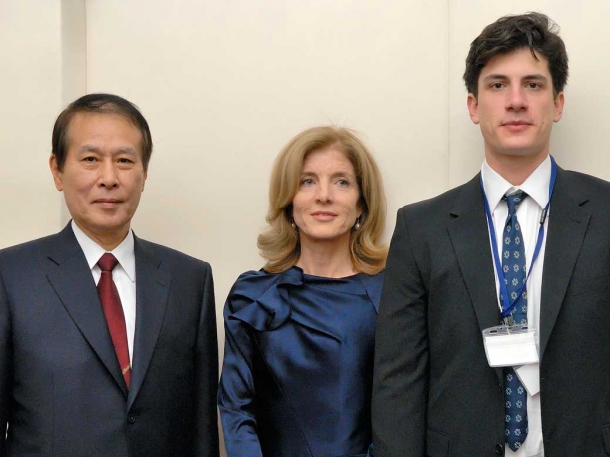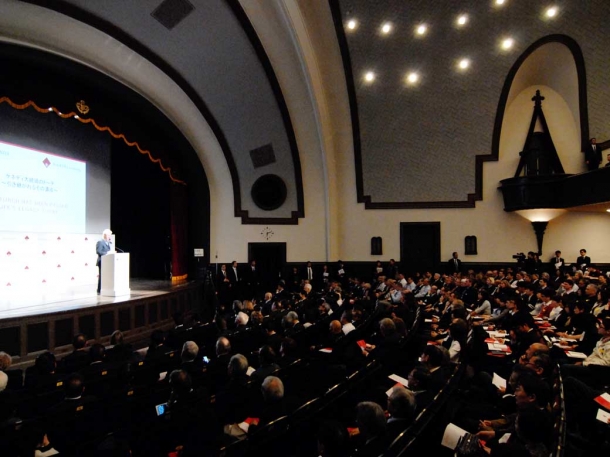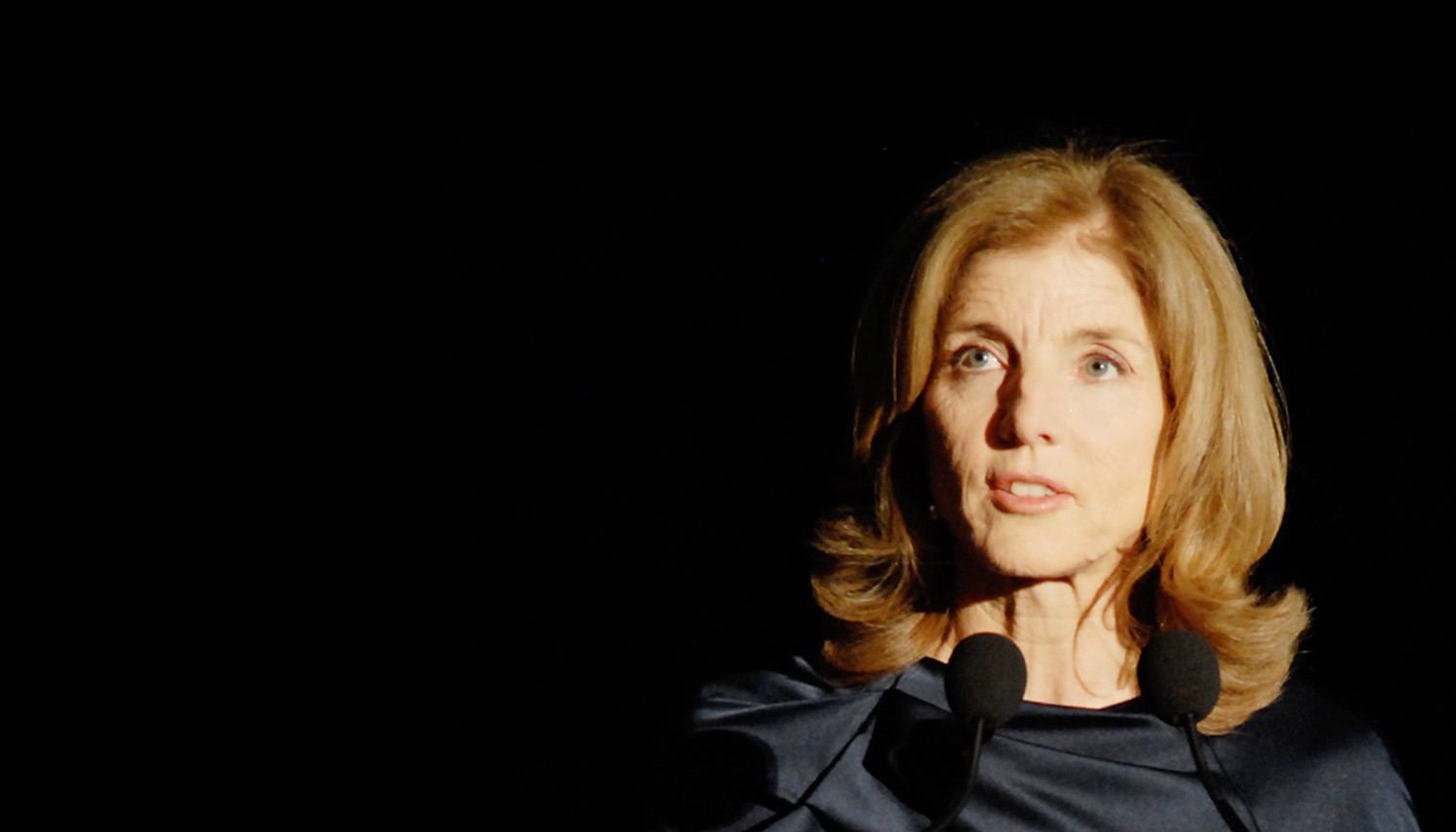Remembering JFK’s Legacy: Bill Clinton, Caroline Kennedy and Shinzo Abe visit Waseda
Wed, Apr 1, 2015-
Tags
Waseda hosts symposium celebrating JFK’s legacy
On March 18, Waseda University, in partnership with the John F. Kennedy Library Foundation, hosted an international symposium on the former U.S. President, titled “The Torch Has Been Passed: JFK’s Legacy Today.” Drawing on the themes of President Kennedy’s iconic inaugural address challenging citizens to give back, push the boundaries of science and innovation, and seek a more peaceful world, the symposium featured speeches from former president Bill Clinton, U.S. Ambassador to Japan and the only surviving child of John F. Kennedy, Caroline Kennedy, as well as Japanese Prime Minister Shinzo Abe. 
The event was held in Okuma Auditorium, the historic building on Waseda’s campus in Tokyo where President Kennedy’s brother, then-Attorney General Robert F. Kennedy, delivered a speech in 1962. Following the conflict in Japan surrounding revision of the U.S.-Japan Security Treaty in 1960, Robert Kennedy’s visit caused controversy on and off campus. Approximately 3,000 students flooded the area around the Auditorium, including some who opposed the Attorney General’s visit. One student loudly interrupted Kennedy’s speech. When the Attorney General invited him onto the stage, he peppered Kennedy with pointed questions. The tense atmosphere was relieved when Waseda’s cheer squad began singing the University’s anthem, and the whole auditorium broke out in song, including the Kennedys. It was only fitting that Okuma Auditorium, the setting for such an important episode in the history of U.S.-Japan relations, was selected to host this symposium focused on solving critical problems and bringing peace to the world.
“Share your wisdom with another generation committed to peace”
 During her opening address, Ambassador Kennedy expressed thanks to Waseda for hosting the symposium at the same location her uncle visited over fifty years ago. She retold how her father met with Kohei Hanami, the Japanese Navy officer responsible for sinking John Kennedy’s PT boat in World War II. She shared a moving story of when she met Hanami’s widow and son recently at the “JFK – His Life and Legacy” exhibit hosted by the National Archives of Japan. Kennedy then read portions of letters exchanged between her father and Hanami after the war.
During her opening address, Ambassador Kennedy expressed thanks to Waseda for hosting the symposium at the same location her uncle visited over fifty years ago. She retold how her father met with Kohei Hanami, the Japanese Navy officer responsible for sinking John Kennedy’s PT boat in World War II. She shared a moving story of when she met Hanami’s widow and son recently at the “JFK – His Life and Legacy” exhibit hosted by the National Archives of Japan. Kennedy then read portions of letters exchanged between her father and Hanami after the war.
Ambassador Kennedy touched on her father’s famous commencement speech at American University, repeating his call to, “Let us focus instead on a more practical, more attainable peace – based not on a sudden revolution in human nature but on a gradual evolution in human institutions-on a series of concrete actions and effective agreements which are in the interest of all concerned. There is no single, simple key to this peace – no grand or magic formula to be adopted by one or two powers. Genuine peace must be the product of many nations, the sum of many acts. It must be dynamic, not static, changing to meet the challenge of each new generation. For peace is a process-a way of solving problems.”
The Ambassador spoke directly to the hundreds of students packing the auditorium, “Over the past 70 years, through countless acts of sacrifice, courage, reconciliation and friendship, our parents and grandparents built an alliance that has provided stability in this region and beyond. It is a gift we can never take for granted. Now it is our turn to continue that work… I hope that the discussion here today will help you decide how you can make your own contribution to freedom and democracy—and that 50 years from now, you will return here to Waseda to share your wisdom with another generation committed to peace.”
John F. Kennedy’s ideals will guide students towards the future

In the Okuma Auditorium Reception Room. (L-R) Waseda President Kamata, Ambassador Kennedy, Ms. Kennedy’s son John Schlossberg
Waseda President Kamata delivered welcoming remarks, noting the University’s Robert Kennedy scholarship, which was established by a donation from Robert Kennedy after his 1962 visit to Waseda. Kamata also commented that Robert Kennedy was often caught humming the Waseda anthem and even owned a music box which played the melody. “I believe the ideals and messages of John F. Kennedy will inspire students and guide them towards the future. Today’s symposium, which reflects on his ideals, is not only significant for the current age, but also for the future.”
Some of Kennedy’s greatest accomplishments include his handling of the Cuban Missile Crisis, signing of the Nuclear Test Ban Treaty, the Apollo space program and laying the foundation for the Civil Rights Act. Business leaders, astronauts and experts in U.S.-Japan relations and government participated in two panel discussions focused on the themes of “The New Frontier” and “A Strategy for Peace.” Students actively participated by posing questions to panel guests.
The moon Rock Clinton inherited from JFK
 Bill Clinton, who first visited Waseda in 1993, spoke in front of a photograph of himself at sixteen, shaking hands with President Kennedy. “The legacy of the Kennedy Administration and the President himself in science and technology, while profoundly important in space, goes far beyond space, to the unfilled space in all of our minds and hearts and the adventures we have yet to undertake.” Clinton said that during his presidency he received a moon rock from the first moon landing. He described how, during an argument with government officials he would say, “‘Stop. Look at that rock. That rock is 3.6 billion years old. We are just passing through and we don’t have enough time, so let’s get something done.’ It always worked.”
Bill Clinton, who first visited Waseda in 1993, spoke in front of a photograph of himself at sixteen, shaking hands with President Kennedy. “The legacy of the Kennedy Administration and the President himself in science and technology, while profoundly important in space, goes far beyond space, to the unfilled space in all of our minds and hearts and the adventures we have yet to undertake.” Clinton said that during his presidency he received a moon rock from the first moon landing. He described how, during an argument with government officials he would say, “‘Stop. Look at that rock. That rock is 3.6 billion years old. We are just passing through and we don’t have enough time, so let’s get something done.’ It always worked.”
Working together in Asia to realize our dreams
 Prime Minister Shinzo Abe shared a story of one of his mentors, Waseda graduate and former Prime Minister Keizo Obuchi. As a young man, Obuchi witnessed and was inspired by Robert Kennedy’s speech at Waseda, and arrived at the Attorney General’s office in Washington D.C. without an appointment. Still, when Obuchi mentioned he was from Waseda and had heard the speech there in 1962, Kennedy received Obuchi in his office.
Prime Minister Shinzo Abe shared a story of one of his mentors, Waseda graduate and former Prime Minister Keizo Obuchi. As a young man, Obuchi witnessed and was inspired by Robert Kennedy’s speech at Waseda, and arrived at the Attorney General’s office in Washington D.C. without an appointment. Still, when Obuchi mentioned he was from Waseda and had heard the speech there in 1962, Kennedy received Obuchi in his office.
Abe praised Waseda as the leader of internationalization in Japan and encouraged students to mention “Waseda” in other parts of Asia. “People love Waseda more than you think around Asia. The reason is that Waseda has displayed consistency in accepting Chinese, Korean and Taiwanese exchange students since the Meiji era. These students have contributed to the rich history of the Takadanobaba area near Waseda,” said Abe.
The Prime Minister closed his remarks by drawing upon the ideals of Kennedy. “Japan must become a place where dreams can come true. Going forward I want to work with our Asian neighbors to realize all of our dreams. I would like to work together to make the world a place that respects civil rights and is accepting of all people. I believe this is how we can spread Kennedy’s legacy.”
Symposium Program
Part 1 15:00-16:30

- Opening remarks from President Kamata and Caroline Kennedy
Panel discussion 1: The New Frontier: Innovation, Inspiration, and Inclusion
Moderator
- Seiichiro Yonekura(Professor, Institute of Innovation Research, Hitotsubashi University)
Panelists
- Charles Bolden(Administrator, U.S. National Aeronautics and Space Administration (NASA))
- Carol Fulp(President and CEO, The Partnership, Inc.)
- Kiyoshi Higuchi(International Astronautical Federation(IAF)Senior Vice President, Japan Aerospace Exploration Agency (JAXA))
- Marie Oshima(Professor and Head, Center for Medical System Innovation, University of Tokyo)
- Koichi Wakata(Astronaut, Japan Aerospace Exploration Agency (JAXA))
Part 2 17:00-19:00
Panel discussion 2: A Strategy of Peace: Crisis Diplomacy & Non-proliferation
Moderator
- Chris Matthews (Host, MSNBC’s ‘Hardball’)
Panelists
- Graham Allison(Professor, Kennedy School of Government, Harvard University)
- Christopher Dodd(Former U.S. Senator; Chair and CEO, Motion Picture Association of America)
- Fumiaki Kubo(Professor, American Government and History, University of Tokyo Graduate Schools for Law and Politics)
- Koji Murata(President, Doshisha University)
- Hatsue Shinohara(Professor, Graduate School of Asia-Pacific Studies, Waseda University)
Closing Remarks
- Introduction of keynote address from Jack Schlossberg, grandson of President Kennedy
- Keynote Address from Bill Clinton
- Introduction of Japanese Prime Minister Shinzo Abe from Caroline Kennedy
- Remarks from Japanese Prime Minister Shinzo Abe
- Closing address from CEO of John F. Kennedy Library Foundation Heather Champion














